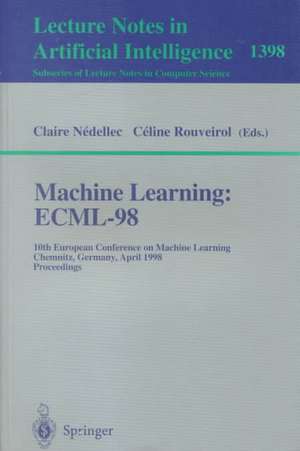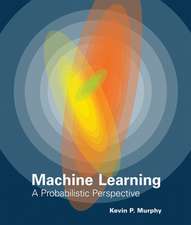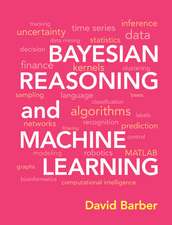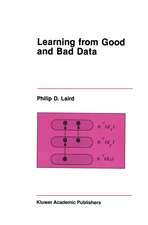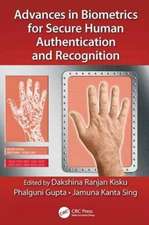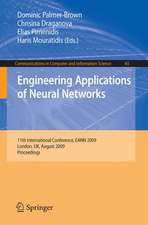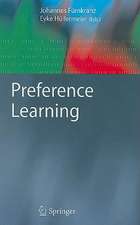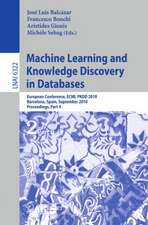Machine Learning: ECML-98: 10th European Conference on Machine Learning, Chemnitz, Germany, April 21-23, 1998, Proceedings: Lecture Notes in Computer Science, cartea 1398
Editat de Claire Nedellec, Celine Rouveirolen Limba Engleză Paperback – 8 apr 1998
The book presents 21 revised full papers and 25 short papers reporting on work in progress together with two invited contributions; the papers were selected from a total of 100 submissions. The book is divided in sections on applications of ML, Bayesian networks, feature selection, decision trees, support vector learning, multiple models for classification, inductive logic programming, relational learning, instance-based learning, clustering, genetic algorithms, reinforcement learning and neural networks.
Din seria Lecture Notes in Computer Science
- 20%
 Preț: 1061.55 lei
Preț: 1061.55 lei - 20%
 Preț: 307.71 lei
Preț: 307.71 lei - 20%
 Preț: 438.69 lei
Preț: 438.69 lei - 20%
 Preț: 579.30 lei
Preț: 579.30 lei -
 Preț: 410.88 lei
Preț: 410.88 lei - 17%
 Preț: 427.22 lei
Preț: 427.22 lei - 20%
 Preț: 596.46 lei
Preț: 596.46 lei - 15%
 Preț: 448.04 lei
Preț: 448.04 lei - 20%
 Preț: 353.50 lei
Preț: 353.50 lei -
 Preț: 389.49 lei
Preț: 389.49 lei - 20%
 Preț: 309.90 lei
Preț: 309.90 lei - 20%
 Preț: 645.28 lei
Preț: 645.28 lei - 20%
 Preț: 763.23 lei
Preț: 763.23 lei - 15%
 Preț: 580.46 lei
Preț: 580.46 lei - 20%
 Preț: 310.28 lei
Preț: 310.28 lei - 20%
 Preț: 655.02 lei
Preț: 655.02 lei - 20%
 Preț: 1183.14 lei
Preț: 1183.14 lei - 20%
 Preț: 340.32 lei
Preț: 340.32 lei -
 Preț: 449.57 lei
Preț: 449.57 lei - 20%
 Preț: 591.51 lei
Preț: 591.51 lei - 18%
 Preț: 938.83 lei
Preț: 938.83 lei - 20%
 Preț: 337.00 lei
Preț: 337.00 lei - 20%
 Preț: 649.50 lei
Preț: 649.50 lei - 20%
 Preț: 607.40 lei
Preț: 607.40 lei - 20%
 Preț: 1414.79 lei
Preț: 1414.79 lei - 20%
 Preț: 1024.44 lei
Preț: 1024.44 lei - 20%
 Preț: 583.40 lei
Preț: 583.40 lei - 20%
 Preț: 453.32 lei
Preț: 453.32 lei - 20%
 Preț: 575.49 lei
Preț: 575.49 lei - 20%
 Preț: 1075.26 lei
Preț: 1075.26 lei - 20%
 Preț: 585.88 lei
Preț: 585.88 lei - 20%
 Preț: 825.93 lei
Preț: 825.93 lei - 17%
 Preț: 360.20 lei
Preț: 360.20 lei - 20%
 Preț: 763.23 lei
Preț: 763.23 lei - 20%
 Preț: 340.32 lei
Preț: 340.32 lei - 20%
 Preț: 504.58 lei
Preț: 504.58 lei - 20%
 Preț: 369.13 lei
Preț: 369.13 lei - 20%
 Preț: 580.93 lei
Preț: 580.93 lei - 20%
 Preț: 343.62 lei
Preț: 343.62 lei - 20%
 Preț: 350.21 lei
Preț: 350.21 lei - 20%
 Preț: 583.40 lei
Preț: 583.40 lei - 20%
 Preț: 583.40 lei
Preț: 583.40 lei - 15%
 Preț: 438.59 lei
Preț: 438.59 lei - 20%
 Preț: 341.95 lei
Preț: 341.95 lei - 20%
 Preț: 238.01 lei
Preț: 238.01 lei - 20%
 Preț: 538.30 lei
Preț: 538.30 lei
Preț: 339.47 lei
Preț vechi: 424.34 lei
-20% Nou
Puncte Express: 509
Preț estimativ în valută:
64.97€ • 67.57$ • 53.63£
64.97€ • 67.57$ • 53.63£
Carte tipărită la comandă
Livrare economică 14-28 aprilie
Preluare comenzi: 021 569.72.76
Specificații
ISBN-13: 9783540644170
ISBN-10: 3540644172
Pagini: 440
Ilustrații: XIV, 426 p.
Dimensiuni: 155 x 235 x 23 mm
Greutate: 0.61 kg
Ediția:1998
Editura: Springer Berlin, Heidelberg
Colecția Springer
Seriile Lecture Notes in Computer Science, Lecture Notes in Artificial Intelligence
Locul publicării:Berlin, Heidelberg, Germany
ISBN-10: 3540644172
Pagini: 440
Ilustrații: XIV, 426 p.
Dimensiuni: 155 x 235 x 23 mm
Greutate: 0.61 kg
Ediția:1998
Editura: Springer Berlin, Heidelberg
Colecția Springer
Seriile Lecture Notes in Computer Science, Lecture Notes in Artificial Intelligence
Locul publicării:Berlin, Heidelberg, Germany
Public țintă
ResearchCuprins
Learning in agent-oriented worlds.- Naive (Bayes) at forty: The independence assumption in information retrieval.- Learning verbal transitivity using loglinear models.- Part-of-speech tagging using decision trees.- Inference of finite automata: Reducing the search space with an ordering of pairs of states.- Automatic acquisition of lexical knowledge from sparse and noisy data.- A normalization method for contextual data: Experience from a large-scale application.- Learning to classify x-ray images using relational learning.- ILP experiments in detecting traffic problems.- Simulating children learning and explaining elementary heat transfer phenomena: A multistrategy system at work.- Bayes optimal instance-based learning.- Bayesian and information-theoretic priors for Bayesian network parameters.- Feature subset selection in text-learning.- A monotonic measure for optimal feature selection.- Inducing models of human control skills.- God doesn't always shave with Occam's razor — Learningwhen and how to prune.- Error estimators for pruning regression trees.- Pruning decision trees with misclassification costs.- Text categorization with Support Vector Machines: Learning with many relevant features.- A short note about the application of polynomial kernels with fractional degree in Support Vector Learning.- Classification learning using all rules.- Improved pairwise coupling classification with correcting classifiers.- Experiments on solving multiclass learning problems by n 2-classifier.- Combining classifiers by constructive induction.- Boosting trees for cost-sensitive classifications.- Naive bayesian classifier committees.- Batch classifications with discrete finite mixtures.- Induction of recursive program schemes.- Predicate invention and learning from positive examples only.- An inductive logic programming framework to learn a concept from ambiguous examples.- First-order learning for Web mining.- Explanation-based generalization in game playing: Quantitative results.- Scope classification: An instance-based learning algorithm with a rule-based characterisation.- Error-correcting output codes for local learners.- Recursive lazy learning for modeling and control.- Using lattice-based framework as a tool for feature extraction.- Determining property relevance in concept formation by computing correlation between properties.- A buffering strategy to avoid ordering effects in clustering.- Coevolutionary, distributed search for inducing concept descriptions.- Continuous mimetic evolution.- A host-parasite genetic algorithm for asymmetric tasks.- Speeding up Q(?)-learning.- Q-learning and redundancy reduction in classifier systems with internal state.- Composing functions to speed up reinforcement learning in a changing world.- Theoretical results on reinforcement learning with temporally abstract options.- A general convergence method for Reinforcement Learning in the continuous case.- Interpretable neural networks with BP-SOM.- Convergence rate ofminimization learning for neural networks.
